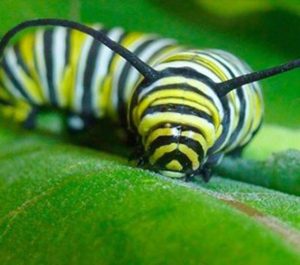 When I did the usual rounds of my vegetable garden this morning, I saw one of the stems of my milkweed plant covered with tiny yellow spots. They were moving. I know nothing about yellow moving spots, so I googled it and found out that they were aphids, known to damage milkweed plants. I cut off the stem and put the whole thing in a bowl of water. Aphids do not qualify for equal rights protection, in my book.
When I did the usual rounds of my vegetable garden this morning, I saw one of the stems of my milkweed plant covered with tiny yellow spots. They were moving. I know nothing about yellow moving spots, so I googled it and found out that they were aphids, known to damage milkweed plants. I cut off the stem and put the whole thing in a bowl of water. Aphids do not qualify for equal rights protection, in my book.
My milkweed plants are sacred territory. I planted them for the sole purpose of attracting monarch butterflies, which are fast disappearing. If you don’t know this, monarchs can only live off of milkweed. The plant provides all the nourishment the monarch needs to transform the caterpillar into an adult butterfly.
Lo and behold, I saw a magnificent yellow and black striped caterpillar on one of the leaves. And a few feet away, hidden under a leaf was another one. I named them Julie and Max. Maybe, Julie is a boy and Max is a girl, but that’s ok. Now, every day, I check on them.
Yesterday Max disappeared. I checked the underside of the leaves, the stems, and the tops. No Max. Maybe a bird had taken him? Maybe he didn’t like his residence and had moved on, although I doubt he could have traveled far, even with all his legs. 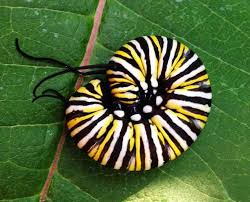
Today, as I was watering my pepper plants, I saw Max lying curled up in a spiral on one of the leaves. He wasn’t moving, so I thought he must be dead. Just to be sure, I snipped the leaf and gently slid Max back on one of the milkweed leaves. Almost immediately his antennae wiggled, his head popped up and he began to crawl up and down, making constant U-turns. What was he doing? Did the fall cause brain damage? Did he lose his sense of direction?
He then found a milkweed pod and started to scrape off the skin until some milk came out which he started to drink. ‘Good old Max, you sure gave me a fright, I thought.
Julie is no trouble at all. Since I discovered her, she hasn’t moved much from her original spot. She eats, sleeps, and poops a lot. When one leaf is half eaten, she moves on to the next, then takes a nap. Maybe I am imagining it, but it looks like she is gaining weight. I read that a caterpillar’s skin doesn’t grow or stretch, so it has to go through 5 moultings before it turns into a chrysalis. Cannot wait for that to happen.
There was a thunderstorm today. When I came home, I checked on Julie and Max. Julie, as usual, is sleepily lying on her favorite leaf. Max has problems, I can tell. He makes these strange jerky movements and there are white things stuck to his stripes. The same white things are sticking to the milkweed pod. What can it be? I google it feverishly. Are they parasites, eating his flesh as I watch? It is demoralizing and Google isn’t much help. I’ll look into him in a few hours and keep you posted. I don’t want you to pray for him since Max and I are not religious, but you could send some good thoughts.
Good news. The white appendages on Max’s body are not parasites. He is such a messy eater, he just drooled all over himself with the milkweed stuff. He is now almost done with that one pod and is ready to tackle a fresh one, but I can see that he is getting drowsy. His flat nose is slowly sinking toward the surface of the leaf and soon he will be sleeping. It’s hard to tell whether he is sleeping or pupating, but he hasn’t yet been molted, so I assume he is just taking a nap.
Did I tell you I just came back from a trip through Oregon? It was exciting and all, but now that I have been sucked into the world of monarch caterpillars, I cannot decide which is more exciting.
Yesterday was not a good day. Both Julie and Max are gone. Disappeared. Vanished. Gonzo. I was upset, as you can imagine. A few days of caterpillar withdrawal symptoms, me walking moodily around my garden, listlessly watering my pepper and tomato plants, every so often circling back to the milkweed, to see if Julie and Max had played a trick on me and were just playing hide and seek.
I finally accepted the inevitability of having been abandoned. Then, I saw a little baby caterpillar, black and yellow stripes included, sitting on a milkweed pod.
I named him Junior, of course. Junior is a ravenous eater. It is easy to find him, he leaves a trail of miniature turds behind on the leaves. A few days of happiness, every morning checking up on Junior. I forgot everything about Julie and Max.
This morning Junior was gone too! What’s with this constant disappearing act? I looked for him for hours, cranking my neck to examine every leaf, then spent an hour hanging tin foil strips around the plant, to deter birds. Wait. You don’t suppose the strips actually attract birds, do they? I could hear one grosbeak say to another: ‘Hey, look at all that shiny stuff over there in Madeleine’s garden bed. Let’s go check it out!’ And then having a go at that delicious yellow and black striped morsel. I read that milkweed is poisonous. Since monarch caterpillars exclusively eat milkweed leaves, that must make them poisonous as well. I hope the birds have done their homework and stay away from my little tenant.
This afternoon I found Junior lying curled up spiral fashion, at the foot of the milkweed plant. With a bit of maneuvering, I put him back on a milkweed leaf. He was not quite sure about that. His antennae started to wiggle, then stop, then wiggle again. He sniffed at the pepper leaf that he had been transported on, gathered himself in a U shape with his back prolegs, looked left and right, and crawled onto a pod which he started to devour.
Ok. Today, I am totally confused. Julie is back. No explanation, no ‘excuse me for having been gone, nothing. Actually, maybe it’s Max? Or a distant cousin who came to visit? Or more likely me having forgotten to put on my glasses and missed him entirely.
Things are trodding along. Julie and Junior are eating away. They are always munching on a leaf that seems to dangle by a thread from the main stem. Is it a ‘do not enter sign? ‘This is MY leaf, stay away’ kind of thing? And how do they manage to stay on a dangling leaf without falling off?
Julie and Junior are now really big and fat. Soon, they’ll be so visible, every predator in the neighborhood will come a-knocking. Stop eating so much, I tell them, get busy transforming already.
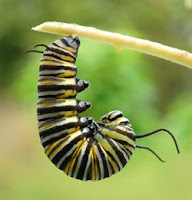 Sure enough, the next day I see that Julie has already assumed the ‘J’ position, hanging by her back prolegs on the underside of a leaf. I go about my day, checking on Julie every so often, but I managed to miss the actual transformation. The next thing I know, I am looking at a green bulb-shaped pod, hanging from the underside of a leaf. I told myself: ‘Oh well, I have another shot at this. Junior is still happily munching away.’
Sure enough, the next day I see that Julie has already assumed the ‘J’ position, hanging by her back prolegs on the underside of a leaf. I go about my day, checking on Julie every so often, but I managed to miss the actual transformation. The next thing I know, I am looking at a green bulb-shaped pod, hanging from the underside of a leaf. I told myself: ‘Oh well, I have another shot at this. Junior is still happily munching away.’
Today it’s Junior’s turn. He is now hanging too. Every fifteen minutes I go out, determined not to miss this second chance. Junior is still hanging, his flat nose touching his tummy. An hour later, nothing. Another hour later, still nothing. I go make some coffee.
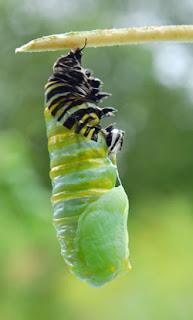
A half-hour later, no more Junior. He has turned himself into a cocoon in my absence. The nerve! I can still see a few yellow stripes covered with a translucent film, but the typical cocoon shape is pretty much complete.
Now I have to wait two long weeks before the next installment. I cross out the days on my calendar as I do for my favorite tv shows. In the meantime, I am thinking of names for the emerging butterflies. Lady Julia? Lord Max? Something regal, I think would fit well. It’s hard for me to admit this, but a lot can still happen to these two little dangling creatures before they emerge in their true form.
I don’t want to, but I google ‘monarch chrysalis predators’. This is what I found (warning to young readers as to the graphic content): Fire ants, lacewing larvae, spiders, wasps, and many Hemipteran larvae are among those that have been reported to prey on immature monarchs (eggs, larvae, pupae). … Parasitoid larvae then eat their prey from the inside out, usually emerging from the prey carcass as a pupa or adult.
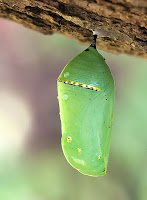 Ok, enough, I am going to barf. We do have an army of red ants crawling around our vegetable garden. What they are doing is not clear. Half of them are carrying white bundles which look like eggs. I think they are looking for a new home, but they don’t seem to be all that interested in the milkweed plants. Wasps I can handle with mosquito netting and I haven’t seen spiders around the plant, but if I do, may God protect you, arachnids. My wrath is unlimited.
Ok, enough, I am going to barf. We do have an army of red ants crawling around our vegetable garden. What they are doing is not clear. Half of them are carrying white bundles which look like eggs. I think they are looking for a new home, but they don’t seem to be all that interested in the milkweed plants. Wasps I can handle with mosquito netting and I haven’t seen spiders around the plant, but if I do, may God protect you, arachnids. My wrath is unlimited.
Now that I have seen this magic firsthand, I cannot just sit back and not witness the denouement. I am hooked, I tell you. The transformation from caterpillar to cocoon is so drastic, it is beyond comprehension. All within the span of 30 minutes. Miracles do happen, you know. Right before our eyes. We are just too busy to pay attention.
I love this real life story. Can’t wait to read the next episode.